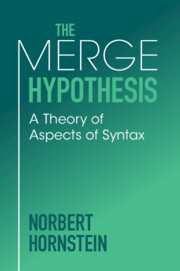Book contents
- The Merge Hypothesis
- The Merge Hypothesis
- Copyright page
- Contents
- Preface
- Abbreviations
- Introduction
- 1 A Whig History of Generative Grammar
- 2 Tools and Particulars
- 3 Adding Labels
- 4 Construal and the Extended Merge Hypothesis (1)
- 5 Construal and the Extended Merge Hypothesis (2)
- 6 A Partial Wrap-Up and Segue
- 7 Labels
- 8 Odds and Ends
- 9 Conclusion
- Bibliography
- Index
4 - Construal and the Extended Merge Hypothesis (1)
A-Chain Dependencies
Published online by Cambridge University Press: 15 February 2024
- The Merge Hypothesis
- The Merge Hypothesis
- Copyright page
- Contents
- Preface
- Abbreviations
- Introduction
- 1 A Whig History of Generative Grammar
- 2 Tools and Particulars
- 3 Adding Labels
- 4 Construal and the Extended Merge Hypothesis (1)
- 5 Construal and the Extended Merge Hypothesis (2)
- 6 A Partial Wrap-Up and Segue
- 7 Labels
- 8 Odds and Ends
- 9 Conclusion
- Bibliography
- Index
Summary
This chapter is based on earlier work on Obligatory Control and Reflexivization in terms of movement. The point here is not to rehash the arguments for movement approaches to control and reflexive binding but to illustrate how movement approaches to construal are consequences of the EMH incorporating the FPG. The EMH/FPG implies that the non-local relation between an antecedent and Obligatory Control PRO (OCPRO) and a reflexive must be mediated by I-merge. In other words, descriptively speaking, such construal relations must “live on” A-chains. As this is effectively what movement theories of OC and Reflexivization have argued, and as the EMH/FPG implies movement theories of both, insofar as such movement theories are successful, to that extent they support the encompassing EMH/FPG theory. I review some arguments showing that movement plausibly underlies such dependencies. However, the discussion is not exhaustive; it is mainly illustrative. The reader is referred to the considerable literature on both topics for the full-scale defense of these movement approaches.
Keywords
- Type
- Chapter
- Information
- The Merge HypothesisA Theory of Aspects of Syntax, pp. 101 - 126Publisher: Cambridge University PressPrint publication year: 2024



